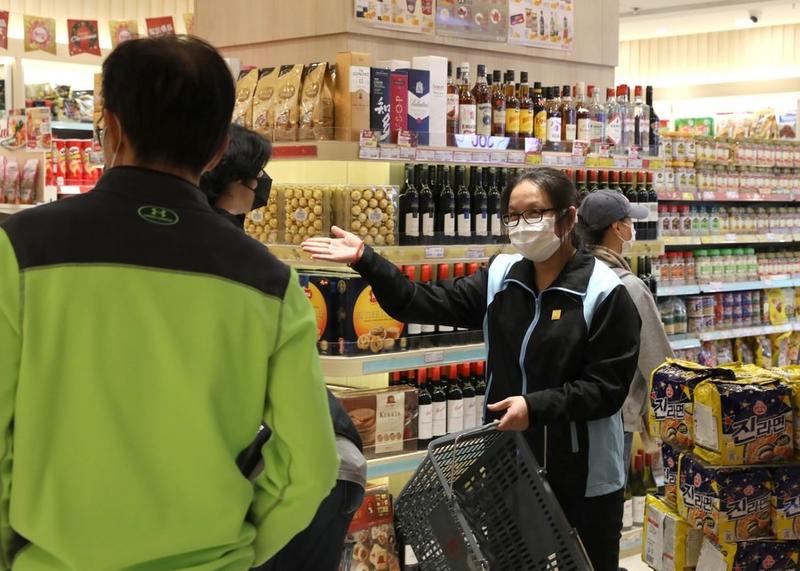 A shop assistant works at a retail chain store in Hong Kong, on Dec 28, 2020. (PHOTO / XINHUA)
A shop assistant works at a retail chain store in Hong Kong, on Dec 28, 2020. (PHOTO / XINHUA)
The Hong Kong Federation of Trade Unions on Monday proposed a mechanism to hit the brake on importing labor when the economy is slow and unemployment is running high, as well as setting up a designated task force to handle affairs relating to imported workers.
The force, under the Labour and Welfare Bureau, will be tasked with handling matters relating to imported workers, including handling complaints and providing assistance to imported workers, and researching and formulating relevant policies for labor importation.
Union representatives also emphasized the importance of improving vocational training for Hong Kong’s construction workers to enhance their competitiveness.
ALSO READ: GBA cities' social insurance available in HK in May
The union put forward its proposals after sending representatives to meet with representatives of Macao’s labor union, as Macao has been actively importing outside labor. According to Macao’s latest official population survey, there were about 155,000 imported workers in Macao as of the end of 2022, representing about a quarter of the city’s total population of 670,000 people. Imported labor in Macao dropped to about 16,000 people earlier in 2022, with most of the losses being workers from hotels, casinos and other service industries, all of which were hit hard during the pandemic.
Anthony Yau Yiu-shing, vice-chairman of the Federation of Trade Unions, said he is concerned that the recent move by the government to allow workers to be imported for 26 occupations – including frontline workers such as clerks, salespersons, and cashiers – will create difficulties for local workers
Anthony Yau Yiu-shing, vice-chairman of the Federation of Trade Unions, said he is concerned that the recent move by the government to allow workers to be imported for 26 occupations – including frontline workers such as clerks, salespersons, and cashiers – will create difficulties for local workers.
READ MORE: Labor import: 2,841 applications for HK aviation jobs okayed
Yau warned that importing an excessive number of workers would negatively impact local workers, as doing so would suppress wages and benefits. He added that data shows that median wages for the food and beverage, hotel, and construction industries in Macao between 2018 and last year had failed to mitigate the increase in inflation.
Urging the Hong Kong government to give the issue careful consideration, Yau said Macao has prioritized certain employment opportunities for local workers by prohibiting the import of workers in three specific occupations – professional drivers, gaming industry dealers, and pit supervisors.
READ MORE: HK hospitality sector calls for importation of 9,000 workers
Hong Kong labor sector lawmaker Dennis Leung Tsz-wing acknowledged that the government’s aims are to address labor shortages, stimulate economic growth, and tackle short-term challenges through importing labor, but cautioned that such measures could lead to long-term problems.
He called for the establishment of a mechanism that would halt the importation of labor to Hong Kong during economic downturns, or when unemployment is running high or industry median wages decrease, to protect the jobs of local workers.
Leung said it had been frustrating for Macao residents when, during the pandemic, many local workers had experienced difficulty in finding a job, while imported workers had been able to retain their jobs.
READ MORE: Labor import: CE stresses ‘bigger pie’ for economic benefits
He stressed the need to take a balanced approach that prioritizes local employment in Hong Kong while promoting sustainable economic development.
Their suggestions came a day after the city’s authorities approved the importation of 2,841 aviation workers by 28 companies during the first round of applications for the Labour Importation Scheme for the Transport Sector – Aviation Industry, which has a cap to introduce 6,300 workers in total from outside the city.
READ MORE: Foreign-worker regulations in Hong Kong need to be improved
On July 17, applications for the newly-launched Labour Importation Scheme for the Construction Sector began. The scheme, with a quota ceiling of 12,000 people, has so far received five applications involving thousands of workers.
Tse Wang-yu, the general secretary of the Hong Kong Construction Industry Employees General Union, said he feared that local workers will lose their competitiveness with the importation of workers, which will ease the labor shortage but will leave little room for local workers to negotiate with employers over wages.
Tse suggested strengthening skills training for Hong Kong’s construction workers to enhance their competitiveness. Additionally, he proposed providing job matching and recruitment information specifically for construction industry workers to address the challenges faced by those seeking to enter the industry.


